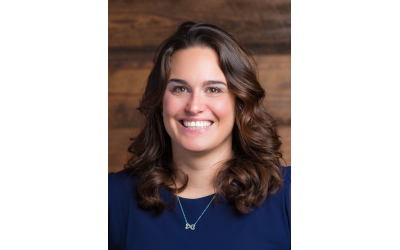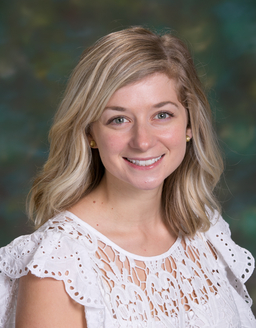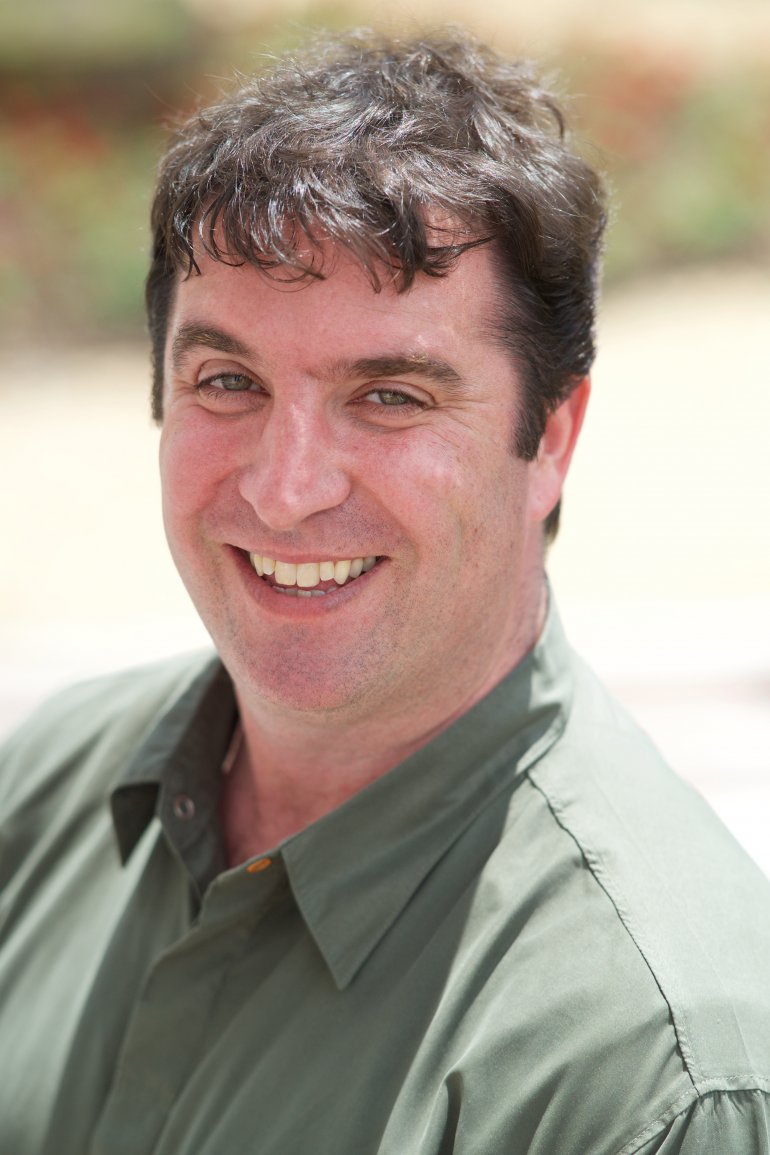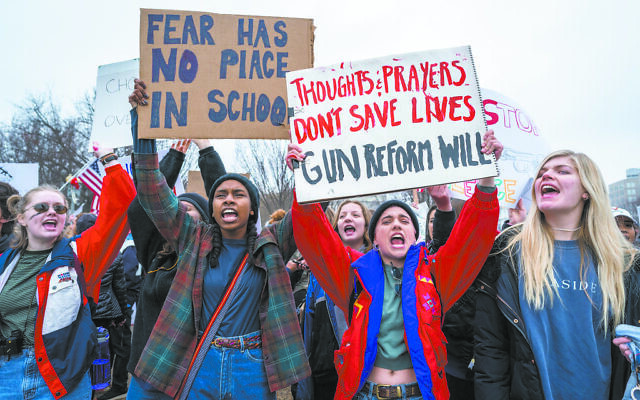Jewish Students Bear Society’s Security Burden
As the Jewish community heightens security, our youth are bearing the emotional impact according to several educators in Jewish Atlanta.
As the Jewish community heightens security, our youth are bearing the emotional impact. “This is not new to them; it’s the world that they’ve always lived in,” said Kelly Cohen, director of JumpSpark, which provides Jewish teen engagement programs. Teens are “hearing more about anti-Semitism and violence, but also more about gun violence. They see them as one thing; different manifestations of one thing.
“In their lives, there’s increased security all over, and there’s a nervousness about being in Jewish spaces and public spaces.”
Teens today are dealing with situations and trauma that their parents were not impacted by, Cohen said.
“I worked at Camp Coleman and one of the students who was killed at Parkland was a camper there. It’s traumatic and I think we’re going to see the effects of raising kids in this traumatic environment,” she said. “We had some members of our fellowship last year who were talking about when they did the walkout of schools and being told by school administrators that if they stood up and walked out there would be punitive repercussions. These teens said to me, ‘We are fighting for our lives here.’ It made them feel very unsafe to hear administrators say, ‘Sit down, stop.’ This isn’t hypothetical for them, this is the reality that they live in.”

Working with Jewish teens on a regular basis, Cohen has noticed a trend around teens’ responses to what they perceive as increased societal violence and hate. “I think it’s trauma,” she said. “I was just at a conference on the rise of anti-Semitism in the Jewish world and thinking about it from a position of Jewish educators. One of the people was presenting trauma responses. We see in teens an increase in anxiety, an increase in depression and these can be a response to trauma.
“Being on the floor at 9 years old, huddled with your classmates, that leaves a mark.”
In one of the largest and most comprehensive studies done of modern Jewish teens, called “Gen Z Now: Jewish Teens Research Study,” released in spring 2019, The Jewish Education Project measured attitudes of teenagers across a wide variety of topics, including security, shootings and anti-Semitism. “The number one most salient point is that teens do not necessarily see the rise of anti-Semitism as a uniquely Jewish issue. They see it as a part of a larger spread of hate and violence in society,” Cohen said.
The awareness about increased anti-Semitism and security has trickled down to younger children as well. “It’s interesting when to start [sharing more information about security] with kids a lot of the times because different families share different information. Older kids share information with younger siblings,” said Molly Levine-Hunt, an elementary school guidance counselor at The Epstein School. “The scariest part is when kids are saying a lot of people want to hurt us just because we’re Jewish.”
“I try not to bring new information in. These kids talk, you know,” Levine-Hunt said, mentioning that they had a second grader announce an anti-Semitic attack to their class before. “Some of them are able to access more information than others on the internet or television. A lot of times parents think if they don’t talk about it at home, they’re shielded, but I think it’s hard, it’s a delicate dance parents have to do.”

Adults, including teachers and school administrators, naturally want to protect children. But because of security measures, they also want to make them aware of what’s happening and why there are “those extra security precautions we have to take especially as a school, as a Jewish school on top of that. Kids are curious by nature,” Levine-Hunt said.
“The most kids are aware is when we have our lockdown drills,” Levine-Hunt said. Though the drills are scary, the school tries to be careful with their language and give children a sense that drills help them to be prepared and have control over their own safety, much like fire drills. “I have a pit in my stomach every time we do it. It scares me, being an adult, being aware of the reality,” she said. Though Levine-Hunt has seen a definite increase in anxiety in children, in general, she hasn’t seen it attributed specifically to fears around security.
However, the Jewish high school students that Cohen works with have been doing active shooter lockdown drills for their whole school careers. “The experience that they have had has been one that for years going to school has been a terrifying experience for some of them. There’s a lot of trauma there already,” Cohen said. “They are more scared of going to school than they are of going to shul.
Obviously, we are worried about the rise in anti-Semitism. Obviously, it’s leading to an increase in security. For a lot of Jewish teens, it’s just another outgrowth of that, not necessarily a uniquely Jewish problem.”
The Jewish Education Project study included interviews with teens about anti-Semitism and reported that though people interviewed express concerns about anti-Semitism, generally they saw it as a wider trend around political extremism and gun violence.
“I think that it was definitely a wake-up call for people who had never thought they even needed an alarm clock before. … Like, it’s really reasonable to panic at there being a pogrom here, but it’s not unfamiliar, and it’s not unexpected,” a teen identified as Sarah-Rosalind said in the report about the Tree of Life synagogue shooting in Pittsburgh, referencing growing anti-Semitism.

“I don’t feel super differently about [Pittsburgh] than I did about like Marjory Stoneman Douglas, or anything like that. Like, yes, I’m a Jew, it’s a shul, but I’m also a high school student, and that was a school,” another student named Annabelle said in the report, reinforcing that her main concern was gun control. The shootings are “all horrible, and I think they’re all equally horrible regardless of how many people it kills, or what gun they used, or who the people were. It’s all the same thing. Yeah.”
For the Jewish community as a whole, there have been some benefits to increased attention to security. According to Zach Williams, who oversees the Jewish Federation of Greater Atlanta’s security efforts that include the Jewish day schools, there is more widespread coordination in the Jewish community around security.
“There’s still an emphasis on preparation and preparedness in the community. If anything has changed, it’s more people being aware. It’s not so much one day maybe it might happen; that mentality’s gone away. You’ve seen a resurgence in a more holistic community approach.”
Active shooter drills, from a security standpoint, are a crucial element for schools and other Jewish institutions. “I think the data has shown that the more involved an individual is in their own self-preservation during an active shooter event, the higher likelihood they’ll survive the attack,” Williams said. “The more involved a classroom is in securing a lockdown or evacuating or whatever the methodology is, … It’s been proven [efffective] through multiple studies but also through multiple active shooter events. Because of that we can’t expect our students and classrooms to effectively be involved in the process unless they know what to do.”
The security-conscious environment is a tangible reality for organizations such as JumpSpark that work with teens, as they consider not only the impact of shootings and anti-Semitism on teens’ emotional health but actually securing their own events. Often their programs use Jewish spaces, which means they must hire a mandatory security guard. They also are very cautious about what information is put on social media when they’re gathering teens for an event. “We hear this all the time from other organizations we work with, how to navigate social media and security,” Cohen said. The Jewish Education Project has started a working group for Jewish educators and professionals who are more interested in security and how it affects young Jews. Their CEO David Bryfman called Gen Z the “lockdown generation,” and encouraged educators to stick with positive Jewish education rather than fear-based, emphasizing that “fear is not a good pedagogy” in an article written for eJewish Philanthropy in October.
Cohen said of addressing security, “None of us wanted to be here; none of us thought that in 2019 this would be the most pressing topic in Jewish education. It just wasn’t the landscape that we thought we’d be doing this work in. A lot of us are having to learn and catch up to help navigate this new reality that we’re doing our work in.”
- Paula Baroff
- Education
- Community
- jewish students
- Security
- School Shootings
- School Safety
- Majory Stoneman Douglas High School
- Parkland Florida
- Kelly Cohen
- JumpSpark
- Molly Levine-Hunt
- The Epstein School
- Camp Coleman
- David Bryfman
- Lockdown Drills
- Zach Williams
- jewish federation of greater atlanta
- Jewish Education Project




comments